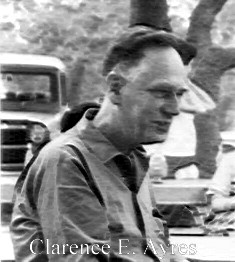| Profile | Major Works | Resources |
Clarence Edwin Ayres, 1891-1972.

Consciously or not, the impression of the American Institutionalist School held by most people in the postwar period was moulded or affected in some way or other by the Texas economist and philosopher, Clarence E. Ayres. While Mitchell waded through neutral statistics and Clark and Commons sought conciliation, it was perhaps Clarence Ayres alone who kept the distinct and confrontational character of American Institutionalism intact.
Many have claimed that Ayres's famous "Institutionalist Dualism", as laid out in, e.g. 1944, 1951, lies at the root of the Institutionalist approach. Ayres's "Dualism" stresses the division and coexistence of "technological" and "ceremonial" behavior, terms derived from Veblen to separate, roughly, the inventive from the inherited aspects of economic structure respectively. Ayres propounded a theory of "institutional lag" whereby technological changes inevitably kept economic technology one step ahead of inherited socio-cultural institutions. The process of Veblenian "evolution" Ayres envisaged was that technological changes were generated by spurts of instinctive inventive activity to innovate in technological processes but that the relatively slow, inherited socio-economic structures would be maladapted to these changes. With glacier-like gradualness, institutions would eventually respond to the new technology, but by the time they adjusted, the next round of inventive activity would have been skipping along further ahead, thus maintaining a permanent lag and thus incogruity between social structures and economic technology.
Ayres's interpretations of Veblen's work have been seen variously as both advancing and stifling the Institutionalist programme. On the one hand, it take a relatively malign view of social institutions as both hopelessly incompetent and regressive, a point irksome to Institutionalists of a "progressive" vein (e.g. Commons). Furthermore, Ayres's insistence on a "technological"-deterministic interpretation of Veblen's evolutionary theory brought him into confrontation with the more subjectivist members (or associates) of American Institutionalism - particularly the belligerent Chicago economist, Frank H. Knight.
However, Ayres himself did not necessarily think progressive policy inherently pointless. For instance, he was himself an avid proponent of "guaranteed income" (i.e. negative income tax, e.g. 1967) and although, quite early on, he identified and denounced the socio-cultural and ideological biases of economic theory (e.g. 1918, 1934), he did not himself argue that it was not capable of assisting both understanding and transformation.
|
Major works of Clarence E. Ayres
|
|
HET
|
|
Resources on Clarence E. Ayres
|
All rights reserved, Gonšalo L. Fonseca
